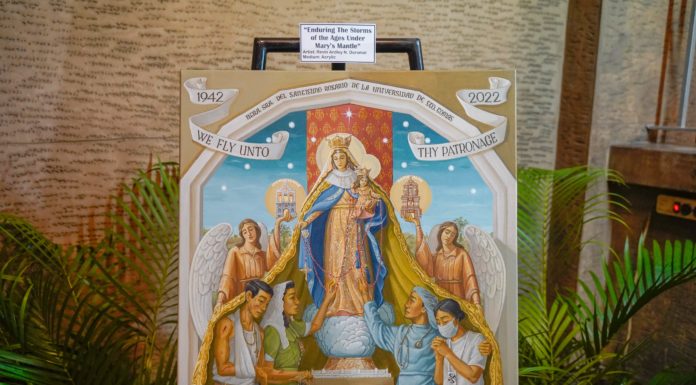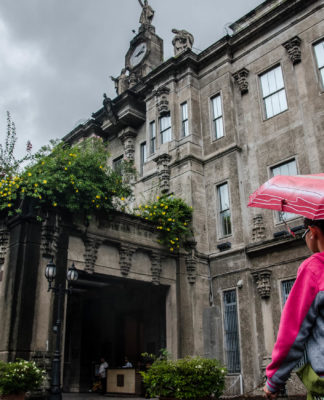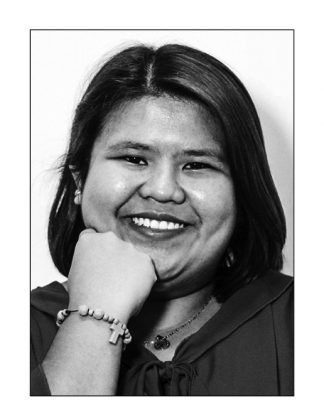DEEDS must follow words.
Speaking before the Thomasian community last Nov. 27, former Polish President Lech Walesa urged the youth to keep their idealism, while stressing the importance of Catholic faith and values in nation-building.
“Look at what the politicians are doing with us. They never kept their words. They cannot lead us,” the Nobel laureate said after accepting an honorary professorship from the University. “Demagoguery and trying to be popular will not allow us to build this world.”
Walesa’s lecture, titled “The Role of Faith on the Struggle for Freedom and Democracy,” focused on key factors needed for a country’s progress.
Young people should work for a “new democracy,” he said. Old democracy is about imposing laws, while new democracy is about “giving responsibilities,” he said.
But one does not need to be a politician to fight for a social order that is “based on values and solidarity.”
“[I]f you will ask God, if you will base everything on values, there is no power that can win over us,” he said.
Walesa, who was assisted by a translator, also said the intellect of the Church is essential in the economic and social development of a country.
“Today we do not know how in democracy we can put everything in the right place. Young democracy is not playing together well and has a lot of doubts. Intellectually, [it] cannot match the intellect of the Church,” he said.
Walesa is the second world leader to be conferred the title honorary professor this year. Former Malaysian Prime Minister Mahathir Mohammad was given the title last June.
Walesa received a medallion and diploma from UST Rector Fr. Herminio Dagohoy, O.P., who was accompanied by Secretary General Fr. Winston Cabading, O.P. and Clarita Carillo, assistant to the rector for academic affairs.
“Whereas, you were awarded the Nobel Peace Prize in 1983 for your struggles and ideals, as a trade union leader and organizer, advocating non-violent human right activism against a communist regime,” Walesa’s diploma states. “You are man of the people, who regarded the Catholic faith as a source of strength and inspiration, and the courage and moral vision of a hero of Polish independence.”
The honorary professorship is given to someone with notable academic achievement, or to an external scholar who has defined himself in the international arena in terms of achievement, leadership, and distinction.
Devout
Walesa, a staunch Catholic, recalled how things changed for Communist Poland when Karol Wojtyla became Pope in 1978. The Pope’s visit to Poland in 1979 boosted the ranks of the “Solidarity” pro-democracy movement that eventually brought down the Iron Curtain.
“We’re asking those big leaders, prime ministers, and kings. All of those big leaders did not give us any chance to gain freedom,” he said.
But the whole Polish nation started to “take part in the meetings of the Pope,” and even policemen and the communists knew how to make the sign of the cross, he added.
“If we want to create a better world, do we need more examples how to want to build it? The values which the Holy Father turned to, turned out to be stronger than rockets and soldiers,” Walesa said.
Walesa also said it takes a proper consciousness to deal with moral questions such as contraception.
“The Polish Church is always conscious of such [issues like population control] and is appealing that it will be the responsibility and proper education that will lead to proper birth control. It has to come out from the conscience, not from imposing condoms and other items,” Walesa said in a chance interview.
Political legacy
The Rector paid tribute to Walesa’s political legacy in Europe, noting that Walesa’s efforts in fighting communism led to the downfall of the Soviet Union and the end of Cold War.
Walesa, who served as Poland’s president from 1990 to 1995, initiated the anti-communist movement in Poland in 1980 by forming Solidarity, which secured rights for shipyard workers.
Walesa said unemployment remains a huge problem and capitalists must provide work for the people to prevent uprisings.
“The world cannot afford unemployment. So let’s start so that we can find work. And if [capitalists] will not start creating work then we will have revolution,” he said.
Walesa’s feat had earned him honorary degrees from the world’s top universities, including Harvard University, the University of Paris, and the Catholic University of Louvain in Belgium. He is also a recipient of several honors such as the Medal of Freedom, an award given by the president of the United States; the Grand Cross of the Order of Bath given by the British government; and the Order of Pius I, First Class, from the Vatican.

















